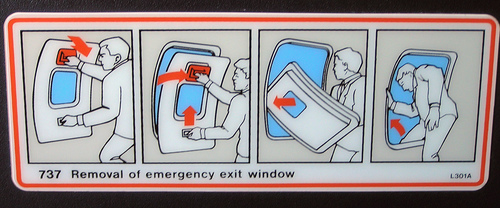WHY are airlines particular about who sits on their Exit seats? The difference between your survival in an aircraft incident and your doom may be in the hands of a fellow passenger and if that person does not have the character and/or cannot shoulder the responsibility, then it is important for him or her to avoid sitting at the exit.
No one prays for a misfortune during a flight; in fact the best flights are those boring, uneventful flights , however; safety regulations give room for airlines to prepare certain passengers to sit on Exit chairs in case of emergencies.
Nigeria Civil Aviation Regulations (Nig Cars) requires that passengers seated in Exit seats meet certain attributes and are willing, able to operate exit doors and assist others in event of an emergency when a crew member is not around, this is a huge responsibility and one that cannot be waived mildly.
After the initial announcements and safety tip recital on board the aircraft, flight attendant(s)visits the Exit seat(s) to enquire if the passenger can handle the responsibility of sitting there after explaining what it entails.
If you are seated at Exit and cannot function under certain conditions or you feel you cannot handle sitting there, the flight attendant is mandated to change your seat and bring in someone who can handle the responsibility.
 Tips:
Tips:
For a passenger to occupy an exit seat, he/she must have mobility, strength and dexterity in both hands and legs to reach upwards, sideways and downwards to the location of emergency exit and escape slide mechanism.
The person must be able to grasp and push, pull, turn, or otherwise manipulate those mechanisms. The person must also be able to shove, pull, turn or otherwise open emergency exit.
He/ she must be able to lift out, hold, deposit on nearby seats or manoeuvre over seats back to the next roll. Object the size and weight of over wing exit doors.
Remove obstruction similar in size and weight of over wing exit doors.
Also, the person sitting on an exit seat must not be less than 15 years of age or lacks the capacity to perform one or more of the applicable functions without the assistance of an adult companion, parent or relation.
A passenger cannot seat on an exit if he/she has non-discernible conditions when performing that function or may suffer bodily harm as a result of performing the function.
A passenger may also not seat on an exit if he/ she shirk the responsibility or lack the ability to read, speak or understand English language or the graphic form specified.
The NCARs also state that if a person lacks sufficient visual capacity to access conditions outside of the exit or cannot carry out the function without the assistance of a visual aids, then he/ she cannot sit on the seat. Also if a person lacks sufficient aural capacity to hear or understand instruction given by a flight attendant without a hearing aid, then he cannot sit on the exit chair.
There are also other considerations like if the passenger is on a wheel chair or if he/ she is with a small child.
All these criteria are elimination methods to sieve out the most fit person to be seated at an exit and these must be done as quickly as possible.
On the upside, anyone seated at the Exit seat handling that critical responsibility is also given a good leg room especially on a long-range aircraft








